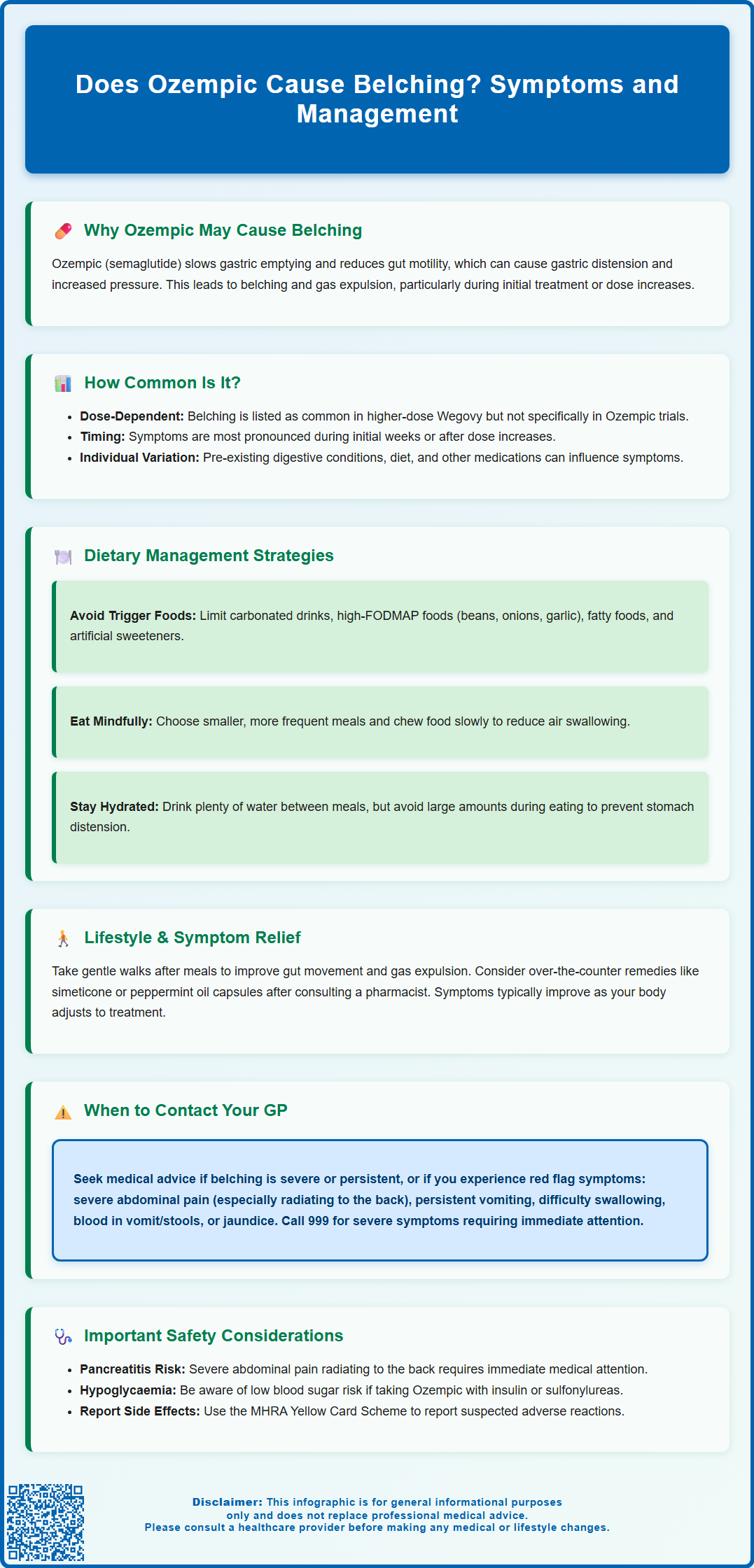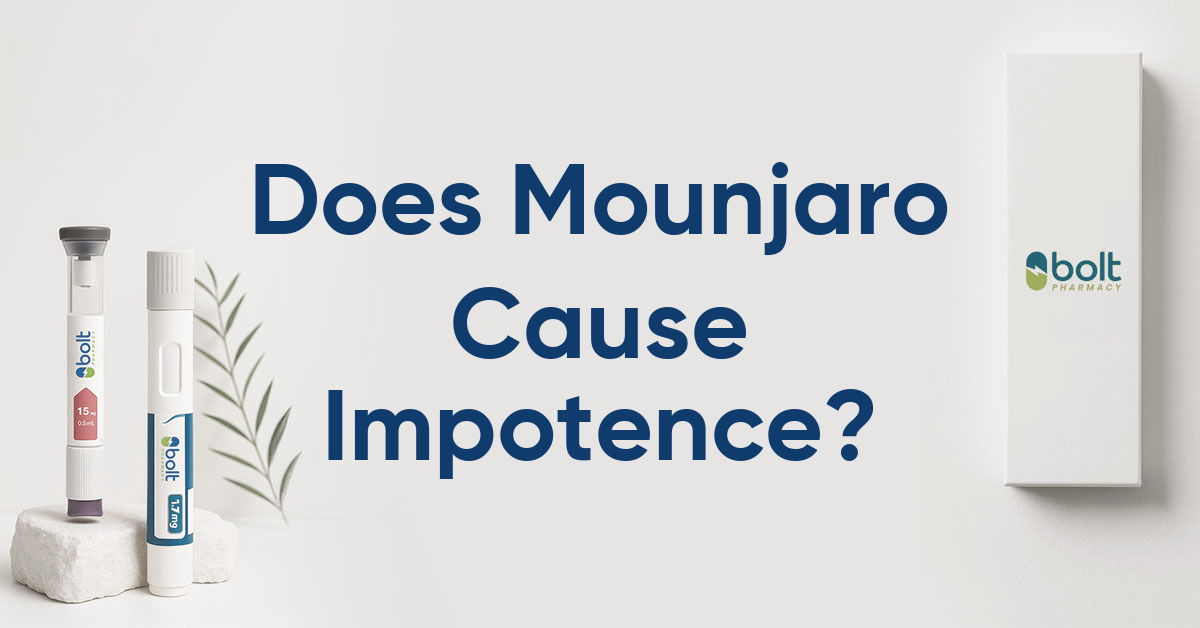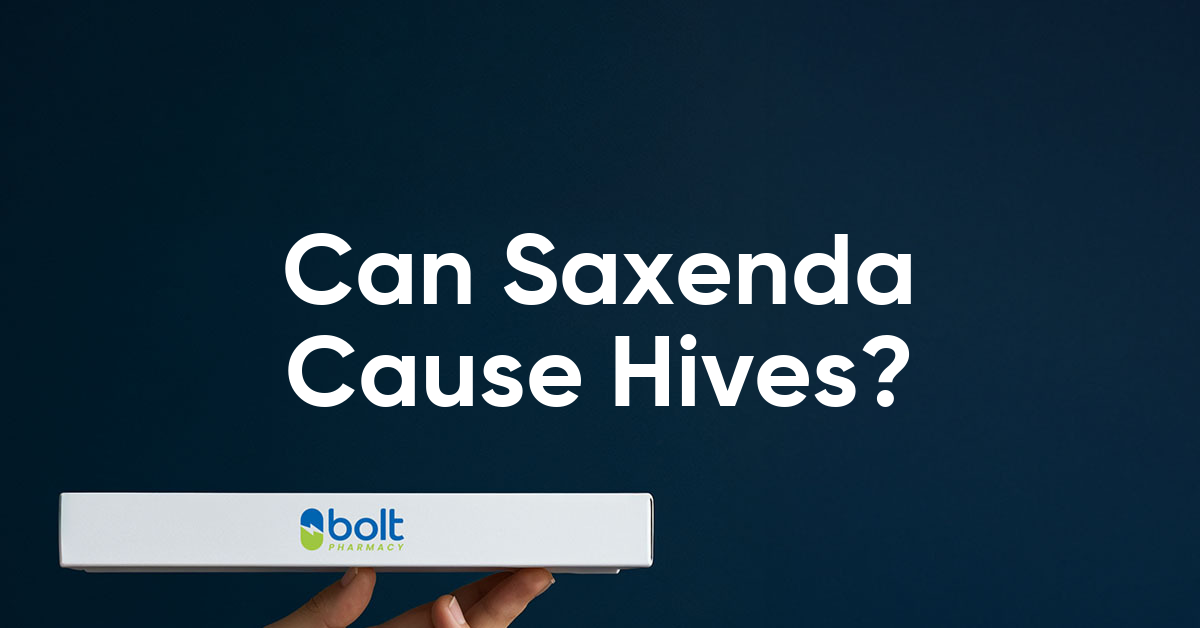Does Ozempic cause belching? Ozempic (semaglutide) is a GLP-1 receptor agonist licensed in the UK for type 2 diabetes mellitus. Whilst belching (eructation) is not specifically listed as a common adverse effect in Ozempic's product information, it is recognised as a common side effect with the higher-dose formulation, Wegovy. Semaglutide slows gastric emptying, which can lead to gastric distension and belching. Gastrointestinal symptoms are amongst the most frequently reported side effects, particularly during initial treatment or dose escalation. Understanding the mechanism and management of belching can help patients continue treatment safely and comfortably.
Summary: Belching is not specifically listed as a common adverse effect for Ozempic, though it is recognised as common with the higher-dose formulation Wegovy and may occur due to delayed gastric emptying.
- Semaglutide is a GLP-1 receptor agonist that slows gastric emptying, which can cause gastric distension and belching.
- Gastrointestinal symptoms including nausea, vomiting, and abdominal discomfort are very common or common with Ozempic therapy.
- Belching appears to be dose-dependent and is more pronounced during initial treatment or dose escalation phases.
- Dietary modifications, smaller meals, and avoiding carbonated drinks can help manage belching and gas symptoms.
- Patients should contact their GP if belching is accompanied by severe abdominal pain, persistent vomiting, or other red flag symptoms suggesting pancreatitis or gastrointestinal complications.
Table of Contents
Does Ozempic Cause Belching?
Ozempic (semaglutide) is a glucagon-like peptide-1 (GLP-1) receptor agonist licensed in the UK for the treatment of type 2 diabetes mellitus. At higher doses, semaglutide is marketed as Wegovy for weight management in adults with obesity or overweight with comorbidities. According to the Medicines and Healthcare products Regulatory Agency (MHRA) approved Summary of Product Characteristics (SmPC), belching (eructation) is not specifically listed as a common adverse effect for Ozempic, though it is listed as a 'common' side effect (affecting up to 1 in 10 people) for Wegovy.
The mechanism of action of semaglutide involves slowing gastric emptying, which prolongs the time food remains in the stomach. This delayed gastric transit can lead to gastric distension, increased pressure, and subsequent belching or eructation. Additionally, GLP-1 receptor agonists reduce gastrointestinal motility more broadly, which may contribute to sensations of bloating, fullness, and the need to expel gas orally.
Patients commonly report a range of gastrointestinal disturbances when initiating Ozempic, including nausea, vomiting, diarrhoea, constipation, abdominal pain, and dyspepsia. Belching may occur alongside these symptoms as part of the broader gastrointestinal adaptation to the medication. While there is no direct link established between Ozempic and belching as a standalone adverse effect in the product information, clinical experience suggests it may occur, particularly during the initial titration phase or after dose escalation.

How Common Is Belching with Ozempic?
Belching itself is not quantified as a distinct adverse effect in the clinical trial data for Ozempic's marketing authorisation. However, gastrointestinal adverse effects are amongst the most frequently reported side effects associated with semaglutide therapy. According to the MHRA-approved SmPC, nausea is classified as 'very common' (affecting more than 1 in 10 people), whilst other gastrointestinal symptoms such as vomiting, diarrhoea, and abdominal discomfort are listed as 'common' (affecting up to 1 in 10 people).
Interestingly, in the higher-dose formulation (Wegovy), eructation (belching) is specifically listed as a 'common' adverse reaction, suggesting that this symptom may be dose-dependent. The titration schedule for Ozempic—starting at 0.25 mg once weekly and gradually increasing to maintenance doses of 0.5 mg, 1 mg, or 2 mg—is designed to minimise gastrointestinal side effects, but individual tolerance varies considerably.
Post-marketing surveillance data suggest that gastrointestinal symptoms, including belching, are more pronounced during the initial weeks of treatment or following dose increases. These symptoms are typically mild to moderate in severity and often resolve as the body adapts to the medication.
It is worth noting that gastrointestinal symptoms may be influenced by various factors, including pre-existing gastrointestinal conditions, concomitant medications, and dietary habits. Additionally, patients who experience significant appetite suppression and altered eating patterns may notice changes in their digestive symptoms, as smaller, more frequent meals or changes in food choices can influence gastrointestinal function.
Managing Belching and Gas While Taking Ozempic
Dietary modifications are often the first-line approach to managing belching and excessive gas in patients taking Ozempic. Temporarily reducing intake of foods known to increase gas production can be beneficial. These include:
-
Carbonated beverages, which introduce additional gas into the gastrointestinal tract
-
High-FODMAP foods such as beans, lentils, certain fruits, wheat, onions, and garlic, which can increase gas production
-
Fatty or fried foods, which can further delay gastric emptying and exacerbate bloating
-
Artificial sweeteners (e.g., sorbitol, mannitol) found in sugar-free products, which are poorly absorbed and can contribute to bloating
Eating smaller, more frequent meals rather than large portions can help reduce the burden on the stomach and minimise delayed gastric emptying. Chewing food thoroughly and eating slowly can also reduce the amount of air swallowed during meals (aerophagia), which is a common contributor to belching. Avoiding drinking through straws, chewing gum, and smoking can also help reduce aerophagia.
Maintaining adequate hydration is important, particularly if constipation is also present, as this can worsen bloating and gas. However, patients should avoid drinking large volumes of fluid with meals, as this can increase gastric distension.
Some patients find relief with over-the-counter remedies such as simeticone (an anti-foaming agent), though evidence for its efficacy is limited. Peppermint oil capsules may help some individuals but should be used with caution in those with GORD as they can worsen reflux symptoms. It is advisable to consult a pharmacist before starting any over-the-counter remedies to ensure they are suitable and do not interact with other medications.
Physical activity, including gentle walking after meals, can promote gastrointestinal motility and help expel trapped gas. Patients should be reassured that gastrointestinal symptoms, including belching, often improve over time as the body adjusts to semaglutide. If symptoms are particularly troublesome during dose escalation, a slower titration schedule may be discussed with the prescribing clinician.
When to Speak to Your GP About Ozempic Side Effects
Patients should contact their GP or diabetes specialist nurse if belching is persistent, severe, or accompanied by other concerning symptoms. Whilst mild belching is generally benign and self-limiting, certain features may indicate a more serious underlying condition or an adverse reaction requiring medical assessment.
Red flag symptoms that warrant prompt evaluation include:
-
Severe or persistent abdominal pain, particularly sudden severe epigastric pain radiating to the back, which may suggest pancreatitis—a rare but serious adverse effect of GLP-1 receptor agonists
-
Persistent nausea and vomiting that prevents adequate oral intake or leads to dehydration
-
Dysphagia (difficulty swallowing) or odynophagia (painful swallowing), which may indicate oesophageal pathology
-
Unintentional weight loss beyond what is expected, or signs of malnutrition
-
Haematemesis (vomiting blood) or melaena (black, tarry stools), which may indicate gastrointestinal bleeding
-
New or worsening symptoms of gastro-oesophageal reflux, such as heartburn or regurgitation
-
Right upper quadrant pain, fever, or jaundice, which may suggest gallbladder disease
For urgent concerns, patients should contact NHS 111 for advice. For severe symptoms such as intense abdominal pain, persistent vomiting, or signs of gastrointestinal bleeding, patients should call 999 or attend A&E.
NICE guidance (NG28 for type 2 diabetes) recommends that patients on GLP-1 receptor agonists should have regular follow-up to monitor treatment response, tolerability, and the development of adverse effects. If gastrointestinal symptoms are significantly impacting quality of life or adherence to treatment, a review of the medication regimen is appropriate.
Patients should also be aware of the risk of hypoglycaemia if they are taking Ozempic alongside insulin or sulfonylureas, particularly if reduced food intake occurs due to gastrointestinal symptoms.
Suspected adverse reactions to Ozempic can be reported via the MHRA Yellow Card Scheme, which helps monitor the safety of medicines in the UK. Open communication between patients and healthcare professionals is essential to ensure safe and effective use of Ozempic whilst minimising the impact of adverse effects on daily life.
Frequently Asked Questions
Is belching a common side effect of Ozempic?
Belching is not specifically listed as a common adverse effect in Ozempic's product information, though it is recognised as common with the higher-dose formulation Wegovy. It may occur due to delayed gastric emptying, particularly during initial treatment or dose increases.
What can I do to reduce belching whilst taking Ozempic?
Dietary modifications such as avoiding carbonated beverages, high-FODMAP foods, and fatty meals can help. Eating smaller, more frequent meals, chewing food thoroughly, and gentle walking after meals may also reduce belching and gas.
When should I contact my GP about belching on Ozempic?
Contact your GP if belching is persistent or severe, or if accompanied by red flag symptoms such as severe abdominal pain, persistent vomiting, difficulty swallowing, vomiting blood, or black stools, as these may indicate serious complications requiring urgent assessment.
The health-related content published on this site is based on credible scientific sources and is periodically reviewed to ensure accuracy and relevance. Although we aim to reflect the most current medical knowledge, the material is meant for general education and awareness only.
The information on this site is not a substitute for professional medical advice. For any health concerns, please speak with a qualified medical professional. By using this information, you acknowledge responsibility for any decisions made and understand we are not liable for any consequences that may result.
Heading 1
Heading 2
Heading 3
Heading 4
Heading 5
Heading 6
Lorem ipsum dolor sit amet, consectetur adipiscing elit, sed do eiusmod tempor incididunt ut labore et dolore magna aliqua. Ut enim ad minim veniam, quis nostrud exercitation ullamco laboris nisi ut aliquip ex ea commodo consequat. Duis aute irure dolor in reprehenderit in voluptate velit esse cillum dolore eu fugiat nulla pariatur.
Block quote
Ordered list
- Item 1
- Item 2
- Item 3
Unordered list
- Item A
- Item B
- Item C
Bold text
Emphasis
Superscript
Subscript










